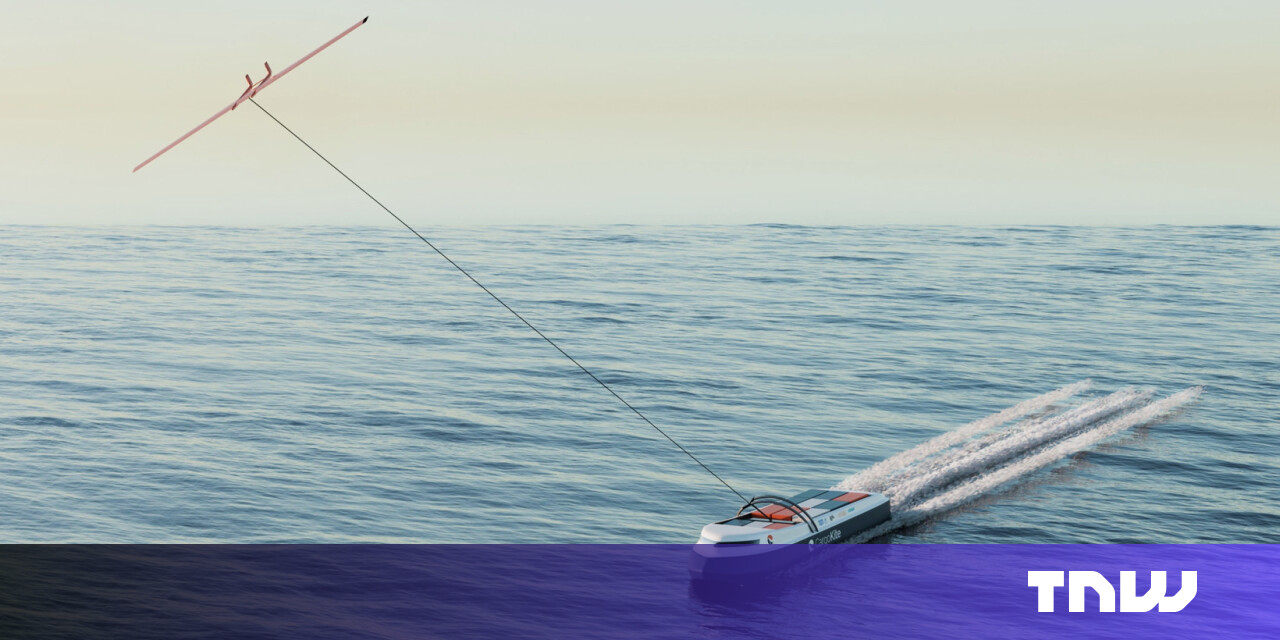Autonomous kite-powered boats promise faster, cheaper, greener shipping
From your phone to your clothes or even the breakfast you ate this morning, there’s a high chance a boat transported it from where it was made to where you bought it from. The global shipping industry accounts for around 90% of world trade.
Most of these goods are ferried by giant cargo ships that carry huge amounts of stuff. But, they’re slow and not exactly nimble. This can result in long waiting times for shipments. What’s more, diesel-guzzling cargo ships contribute around 3% of global CO2 emissions — more than air travel.
German startup CargoKite wants to replace these vessels with fleets of small, autonomous, wind-powered boats that could get the job done faster, cheaper, and without the emissions.
A giant kite drags the boat along, harnessing higher-altitude winds at around 300 metres. These winds are more constant and steadier than air flowing closer to the ground. Because they harness free wind-power, the boats are a lot cheaper to run than traditional cargo vessels, which use over half of their operating costs on fuel alone.
For really calm days, CargoKite will equip its boats with a diesel-electric motor as a backup power source. The long-term goal is to go either fully electric or use zero-emissions fuels.
CargoKite’s boats will fly on hydrofoils, which lift the hull out of the water, reducing drag. As a result, the company expects its boats will travel twice as fast as a conventional cargo ship. Their small size also means they’re more nimble at port — able to unload and offload goods faster.
But the real innovation, and CargoKite’s primary IP, is its software.
AI-powered navigation
CargoKite has built an algorithm that autonomously controls the balance between the kite and the hydrofoils, improving efficiency.
CargoKite has also developed an AI-powered route planner. The tool calculates the optimal route and precisely determines the ETA of a vessel based on real-time weather conditions.
Marcus Bischoff, an avid kitesurfer and entrepreneur, came up with the idea for CargoKite during his time at the Technical University of Munich.
“Being a passionate kite surfer for more than 20 years and an engineer at heart, I was always fascinated by the enormous forces that a kite can generate,” said Bischoff on the company’s website.
“Combined with the major advances in control engineering and in the use of kites as a retrofit for ships I saw an inflection point in technology that enables a new ship class.”


Bischoff later teamed up with fellow students Amelie Binder and Tim Linnenweber. The partners founded CargoKite in 2022 to bring the concept to life.
The company has since grown to 16 employees, based at a small office in Munich. It has secured pre-seed backing from a US early-stage fund, SOSV, and this week signed a collaboration agreement with Lomarlabs, the venture arm of British shipping firm Lomar.
Stylianos Papageorgiou, managing director of Lomarlabs, called CargoKite a “radical new ship type” that has the potential to “reframe the way port and maritime logistics are organised” and become a “groundbreaking decarbonisation solution for shipping.”
Last year, CargoKite tested a 9 metre catamaran with a kite system and hydrofoils in the Atlantic ocean. The company is now in the design phase of its full-size vessel and the construction of its demonstrator prototype. It aims to launch its first fleet in 2027.


